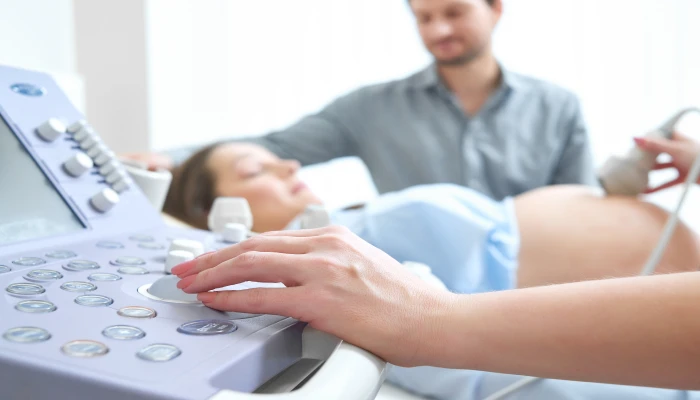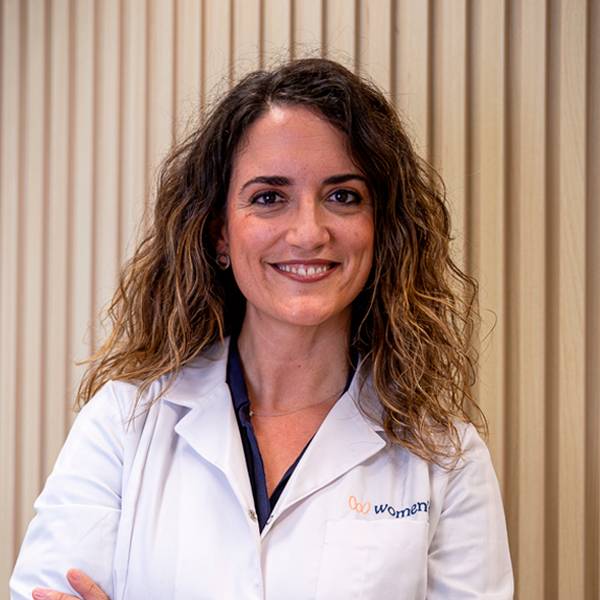Pregnancy and childbirth are unique experiences during which you should feel comfortable and safe. That’s why we want to provide you with comprehensive and individualized care.
At Women’s, a specialized team of experienced gynecologists, midwives, physical therapists, and nutritionists are available to assist you during pregnancy, childbirth, and the postpartum period.
Our priority is to be by your side, taking care of you and your baby so you can have a wonderful experience.
Pregnancy care and monitoring
Monitoring your pregnancy includes gynecological exams, ultrasounds, and medical tests to ensure proper prenatal diagnosis, fetal well-being monitoring and a comfortable and safe pregnancy.
Check-ups
1st visit: we perform the first ultrasound examination (at 6-9 weeks) to monitor the progress of the pregnancy, the size of the embryo, the number of embryos and their heart rate.
2nd visit: First-trimester screening to assess the risk of chromosomal abnormalities. We ask for a first-trimester analysis (at 8 to 10 weeks) and a detailed ultrasound scan (at 11 to 13 weeks), which allow us to rule out the presence of chromosomal abnormalities.
3rd visit: ultrasound examination in the 16th week is optional, but it is highly recommended, as it allows us to diagnose anatomical changes in the baby at an early stage. It is especially useful for early assessment of proper fetal organ development.
4th visit: the second-trimester morphological scan (at 20-21 weeks) will assess the fetal anatomy, growth, placenta, and umbilical cord. We will also request a second-trimester analysis (at 24-28 weeks), along with an O’Sullivan test to rule out the development of gestational diabetes.
5th visit: we evaluate second-trimester results and provide information about pertussis and anti-D vaccination (Rh negative).
6th visit: we perform the usual tests and answer all your questions. The 3D scan is optional and allows us to see the baby’s face very clearly.
7th visit: we will perform the third-trimester examination (at 32-34 weeks) to assess the fetal growth (weight, height, position, and well-being) and perform the systematic anatomical examination. We will also request the third-trimester analysis.
8th visit: we will discuss the birth plan and take a vaginal-rectal culture (at 35-37 weeks) to detect group B streptococcus and rule out complications.
Final three visits: we monitor and check your baby’s well-being and health, movements, heart rate and uterine activity.
Maternity and Gynecological Ward
We are located at the Corachan Campus (Barcelona), where expectant mothers have access to modern and comfortable facilities. The obstetric area includes 4 rooms for labor preparation, dilation, and fetal monitoring, as well as 4 delivery rooms (one of which is equipped with a bathtub and systems to promote physiological birth) and two new operating rooms equipped with the latest technology, especially for surgical deliveries.
The maternity ward also has a neonatal unit that can care for premature babies from 28 weeks of gestation.
Nutrition, physiotherapy, and postnatal care
At Women’s, we offer complementary services to help you manage the physical discomforts of pregnancy, prepare for childbirth, and care for you during the postpartum and breastfeeding periods.
- Nutrition and Dietetics: we provide personalized advice tailored to your lifestyle, physical condition, and stage of pregnancy.
- Physiotherapy: to make you feel less uncomfortable and more relaxed during pregnancy and better prepared for delivery.
- Postnatal esthetic treatments: to remove or minimize stretch marks and postnatal or cesarean scars with the gynecological laser MonaLisa Touch®, in consultation, under local anesthesia and in just a few sessions.
Exercise during pregnancy
At Women’s, we recommend that expectant mothers take regular, controlled exercise during pregnancy, unless it is a high-risk pregnancy.
Moderate exercise during pregnancy, unless your OB-GYN recommends otherwise, will help your body prepare for birth and positively impact your health by reducing pain sensation and stress.
Remember, if you exercise regularly during pregnancy, you:
- Reduce your risk for gestational diabetes.
- Maintain proper weight gain.
- Increase your stamina and muscle strength.
- Improve circulation and control blood pressure.
- Increase lung capacity.
- Regulate your bowel rhythm and reduce digestive discomfort.
- Reduce lower back pain.
Birth preparation and pelvic floor classes
Birth preparation and pelvic floor training will help you both physically and emotionally.
Birth preparation and pelvic floor training will help you both physically and emotionally.
Physical exercise, pelvic floor strengthening, breathing and relaxation exercises and advice on breastfeeding or caring for your newborn baby will help you to experience childbirth and the postnatal period in a more comfortable, safe, and relaxed way.
During the childbirth preparation course, you will learn:
- Breathing and relaxation exercises
- Exercises to relieve pregnancy discomforts
- Birth preparation and pelvic floor exercises
- Perineal massage
- The process of childbirth and the postnatal period
- Newborn care
- Breastfeeding
- Postnatal care and restoration and strengthening of the pelvic floor
Nutrition and dietetics
In the period before conception, during pregnancy and after birth, it is especially important that you pay attention to a balanced and high-quality diet. Nutrition is one of the most important factors that can affect your health and the health of your baby.
If you know how to eat a varied, balanced, and natural diet, you will have the vitamins and minerals you need to meet your own needs and those of your baby.
At Women’s we advise you according to your lifestyle, physical condition, and stage of pregnancy.








